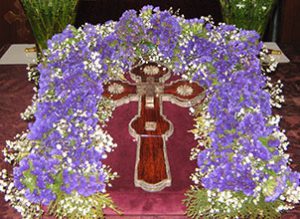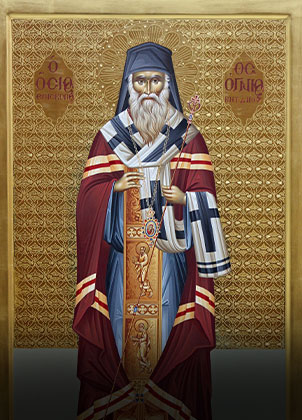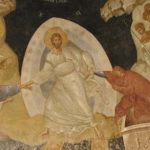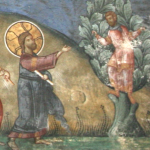Духовное Единство Церкви в Обстоятельствах Административной Раздробленности
Прот. Никита Григорьев
Январь 2017
Слава Святей, Единосущней, Животворящей и Нераздельней Троице!
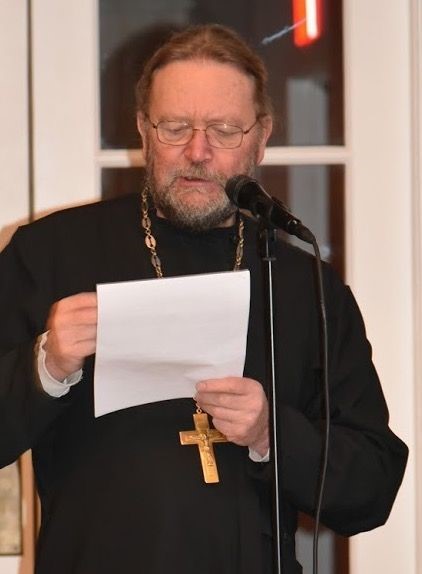
Этими словами начинается всенощное бдение. Троица совершенно Нераздельна, потому что Она совершенно Святая и есть, в сущности, совершенная любовь. У Бога не может быть ни малейшего оттенка греха и потому не может быть никакого разделения, потому что разделение происходит от греха. Троица Святая – это Бог Един.
Эту величайшую тайну единства Пресвятой Троицы Христос обещал распространить и на Свою Церковь. Христос молил Отца, дабы Церковь Его была едина, как и Он един во Отце и в Духе Святом.
Церковь Христова едина потому, что она святая. Её духовное единство – естественное последствие Её святости и взаимной любви среди её членов. А святость Церкви от Духа Святого, который в ней живёт и дышит и который называется Духом Истины. Ясно, что единство Церкви происходит от Духа Истины которым она живёт и от взаимной любви её членов, сплочённых Духом Святым во едино тело Христово.
Но Церковь Христова включает в себя не только Бога, но человеков. И она также состоит из двух частей: Торжествующей и Воинствующей. Эти две части неразрывно связаны между собой молитвенно и духовно. Так с кем же воюет воинствующая часть Церкви? Апостол нас учит, что наша брань не с плотью и кровью, а с духами злобы поднебесной. А начальник их сам сатана: отец лжи и всякого лукавства, от чего происходит всякий грех и разделение.
Потому, когда начинает вкрадываться в человека ложь или лукавство, тогда отходит Дух Истины, то есть Дух Святый, и начинается отпадение человека от Церкви. Мы все люди и потому все грешные. Ибо как писание говорит: “всяк человек ложь”. Св. Андрей Критский вопиет: “беззаконновахом, неправдовахом пред Тобою”. И Церковь во время панихиды повторяет: “несть человек, иже жив будет и не согрешит. Ты бо един кроме греха, и правда твоя – правда во веки и слово твое Истина”. Всякий грех зарождается от лжи и лукавства. Даже сам основной первородный грех гордости основан на ложном представлении человека о своей личной важности и независимости от Бога. Итак, всякий грех несёт в себе какую-то ложь или лукавство. И поскольку всякая ложь или лукавство отгоняет от нас Духа Святого, Духа Истины, тем самым всякий грех отделяет нас от Церкви Христовой.
На то Бог и дал нам таинства покаяния и исповеди. Потому в разрешительной молитве после исповеди и покаяния человека, священник просит Христа Бога: “Примири и соедини его святей Твоей Церкви”. Таким образом грешник присоединяется опять к святой Церкви святых и причащается Святаго Тела Христова. Ибо пред самым причащением священник возносит тело Христово и громко провозглашает: “Святая: святым”. На что лик сразу отвечает: “Един Свят, Един Господь Иисус Христос”. Так как же Церковь может быть святой, когда в ней только “Един Свят, Един Господь Иисус Христос”, а все остальные грешники в большей или меньшей степени? Святость – это нескончаемый путь, по которому мы всегда должны идти, и идеал, к которому всегда должны стремиться.
Вот в этом и вся разница между пшеницей и плевелами и между овцами и козлищами. Все люди грешные. Но те люди, которые себя осуждают и искренно каются в своих грехах, получают отпущение грехов в таинстве исповеди и присоединяются к святой Церкви Христовой. Те же, которые себя оправдывают и не желают каяться и, наоборот, обвиняют только других, остаются в своих грехах. Нераскаянностъ и жизнь во грехах делают человека равнодушным ко греху и постепенно усыпляют его совесть. Тогда человек становится равнодушным и ко лжи. Это может дойти до такой крайности духовного ожесточения, что человек будет называть правду ложью, а ложь правдой и зло добром, а добро злом. Это и есть хула на Духа Святого. Это конечная духовная смерть. Это падение в пропасть греховную и полное отпадение от Церкви Христовой.
Итак Церковь Христова не состоит только из святых людей, но в большинстве, из грешников. Но из грешников кающихся и стремящихся к святости. И Церковь остается святой, несмотря на то что в ней грешники, потому что святость Её не от них, а от Духа Святого, который влечёт этих кающихся грешников к святости. Точно так же и духовное единство Церкви не нарушается, когда некоторые члены Её враждуют между собой и разделяются. Люди постоянно ссорятся между собой. Ибо жить людям мирно в единомыслии и любви это самое трудное и потому это самое высокое достижение. Причины вражды всегда те же самые: гордость, жадность, зависть и властолюбие.
Недоразумения часто возникают между людьми, но они легко упраздняются когда обе стороны ищут правды и мира. Но когда разногласия основаны вот на этих грехах, тогда примирение невозможно, пока зачинщики недоразумения не осознают свой грех и искренно покаются в нём.
В приходах, как в любой семье, люди часто ссорятся между собой. В лучшем случае, каждый осознает свою вину и просит друг у друга прощения. Если это покаяние искреннее, тогда наступает примирение и оба получают духовную пользу и опыт. Но если нет покаяния, а только самооправдание с обеих сторон, тогда происходит разделение, и одна или обе стороны могут выйти из прихода. Весь остальной приход, конечно, очень переживает эту междоусобную ссору и скорбит об отделении их. Но никому в голову не придёт называть их раскольниками или считать их отлученными вообще от Церкви Христовой.
Но другое дело, когда недоразумение или вражда возникает между иерархами. Если это доводит до разделения между ними, то оно непременно распространяется и на их паству. Когда разделение происходит между иерархами, то тогда оно часто разделяет и паству, особенно если иерархи, злоупотребляя своей властью, несправедливо запрещают или даже отлучают от Церкви людей, с которыми они не согласны и на которых они смотрят как на своих противников. Поэтому в истории Церкви постоянно происходили и продолжают происходить разделения. И мы на каждой службе молимся “О благостоянии святых Божиих Церквей и соединении всех”. И в большинстве случаев в Церкви Христовой, истинно православные люди каются в своих личных грехах и заблуждениях, и причины недоразумения выясняются и разделения упраздняются.
Духовное единство Церкви основано на чистом и неповрежденном исповедании святой Православной Веры и на подлинном Апостольском преемстве. Когда Православие остается нетронутым, тогда не происходит духовное разделение Церкви и, следовательно, отделение от Церкви какой-либо части. А происходит лишь разделение между некоторыми её членами. Такое разделение, поверхностное как волны на море, не касается духовного единства Церкви, которое остается незыблемым и спокойным, подобно тому как и море в глубине остается спокойным, даже когда буря бушует на поверхности. Духовное единство Церкви не нарушается, даже когда враг Церкви пытается ввести новое и ложное учение, искажающее православную веру и церковное предание. Всякая ересь и ложное учение Церковью осуждается, и те, кто упорно его придерживаются, отпадают от Церкви.
Отпавшие от Церкви могут возвратится в Церковь только через полное отречение от ереси и лжеучения и после искреннего покаяния, через особый чин, установленный Церковью для их принятия.
Попытки собрать еретиков вместе, как бы в одну церковь, не взирая на их ереси и заблуждения, и без искреннего отречения от этих ересей, это и называется экуменизмом. И экуменизм сам по себе страшная ересь, и осужден Церковью анафемой экуменистам.
А попытка собрать разделенных между собой православных христиан – это никакой не экуменизм, а наоборот это братская любовь и непременная обязанность каждого православного христианина и члена единой Церкви Христовой. Христос нас учит: “Если брат твой согрешил против тебя, то обличи его наедине. Если тебя не послушает, то возьми с собой ещё одного или двух и объясни ему, в чем он согрешил. А если их не послушает, то сообщи об этом Церкви. А если и Церковь не послушает, тогда да будет он тебе, как язычник и мытарь”.
Из этого ясно видно, что когда у нас разделение с другим членом Церкви, будь то ложное исповедание веры или просто личная обида, то нельзя отворачиваться от него и разделяться с ним. Наоборот, мы обязаны объясниться с нашим братом и указать ему в чем он не прав. И причём не только раз и не два, но даже в третий раз уже прибегнуть к собору святой Церкви, чтобы соборно в Церкви разрешить разногласия. И вот если брат поймёт и покается, то приобрёл ты своего брата, – Христос говорит, – и разделение в Церкви упразднится.
Поэтому совершенно недопустимо, чтобы во время разобщения или разделения в Церкви, православные христиане оставались каждый сам по себе и отказывались даже иметь разговор или общение со своими собратьями. Такое поведение само по себе большой грех, так как способствует терзанию и разделению Тела Христова. Упорное нежелание объясниться и примириться и соединиться с братьями по вере, это грех нарушения первой заповеди Христовой: “да любите друг друга”. Такое поведение изолирует человека от Церкви и приводит к расколу, где он полностью отпадает от Церкви. Церковь Христова зиждется не только на совершенной Истине, но и на полной любви между её членами. Где все совершается правильно по букве закона, но любви никакой нет, тогда это не истинная Церковь Христова, а только внешняя оболочка и подделка под Церковь.
Истинная любовь не может равнодушно смотреть на брата, который ошибается или впадает в грех и разделение. Истинная любовь между членами Церкви Христовой заставляет нас обратиться к брату, с которым у нас произошло недоразумение или разделение. Разделение в Церкви – это рана на Теле Христовом. От этой раны все тело болеет и переживает и стремиться уврачевать и исцелить эту рану и разделение. Истинные православные христиане это не те, кто совершенно безгрешные и святые, ибо только один Бог Свят, а это те, кто искренно и непрестанно борются с грехом и стремятся к святости в Церкви Христовой. Точно также, истинные христиане это те, которые, несмотря на то, что сатана всегда старается разделять нас и “сеять нас яко пшеницу”, всеми силами стремятся к единению в Духе Святом.
Христос нас ясно предупреждает: “не каждый говорящий Мне Господи, Господи войдет в Царство Небесное, а только те, которые творят волю Отца Моего”. А воля Божия в том, чтобы мы, ученики Его, все были едины, как и Троица Святая – Едина. Время нам дано короткое, и оно быстро истекает. Если же мы не стремимся всеми силами к Святому Единству Церкви Христовой, то нам надо себе задать очень важный вопрос: православные мы христиане или нет? И узнает ли нас Христос, когда придет? Или Он скажет нам тогда самые страшные из всех слова: “Я не знаю вас. Отойдите от Меня, делающие беззаконие!”
The Spiritual Unity Of The Church Amidst Conditions Of Administrative Fragmentation
Protopriest Nikita Grigoriev
January 2017
Glory to the Holy Consubstantial and Indivisible Trinity!
With these words begins the all-night vigil. The Trinity is absolutely Indivisible,because It is perfectly Holy and is, in essence, perfect love. God cannot have even the slightest shade of sin and therefore He cannot have any sort of division because division proceeds from sin. The Holy Trinity is the One God.
Christ promised to extend this supreme mystery of unity of the Most Holy Trinity onto His Church as well. Christ prayed to the Father, that His Church would be One, just as He is One in the Father and in the Holy Spirit.
The Church of Christ is one because it is Holy. Its spiritual oneness is a natural consequence of its holiness and of the mutual love amongst its members. The Holiness of the Church derives from the Holy Spirit Who lives and breathes in Her it and Who is called the Spirit of Truth. It is clear that the unity of the Church comes from the Spirit of Truth by Which it lives and from the mutual love of its members joined together by the Holy Spirit into the One Body of Christ.
But the Church of Christ includes not only God but humans as well. And likewise, it is comprised of two parts: the Church Triumphant and the Church Militant. These two parts are inextricably linked together spiritually and through prayer. So, with whom does the Church Militant wage battle? The Apostle teaches us that our battle is not with flesh and blood, but with the spirits of wickedness in high places. And their head is satan himself: the father of lies and all deception, which are the cause of all sin and division.
This is why when falsehood or deception begin to creep into a person, the Spirit of Truth departs, i.e., the Holy Spirit Himself and so commences the falling away of the person from the Church. We are all human and therefore all sinners. For as the scriptures say: “every man is a liar”. St. Andrew of Crete hymns, “we have transgressed, we have been untruthful before Thee”. And the Church repeats during the Requiem Service, “there is no man who has lived and has not sinned. Thou alone art without sin and Thy truth abideth unto the ages and Thy word is Truth.”
Every sin is engendered by falsehood and deceit. Even the basic primordial sin itself – pride is based on a person’s false impression of his personal importance and independence from God. Thus every sin bears within itself some sort of falsehood or deception. And since every falsehood or deception drives away from us the Holy Spirit, the Spirit of Truth, likewise every sin separates us from the Church of Christ.
For this reason God gave unto us the mysteries of repentance and confession. This is why in the prayer of absolution after a person’s confession and repentance, the priest asks Christ God “to reconcile and unite him/her to the Holy Church”. In this manner, the sinner is again joined to the Holy Church of the Holy and partakes of the Holy Body of Christ. For just prior to administering the communion, the priest elevates the Body of Christ and loudly proclaims, “Holy things for the holy” to which the choir immediately responds: “One is Holy, One is the Lord, Jesus Christ”. So how can the Church be Holy when it contains only “One Holy, One Lord Jesus Christ”, while all the rest are sinners to a greater or lesser degree? Holiness is a never-ending direction along which we must always walk and the ideal for which we must always strive.
Within this lies the entire difference between the wheat and the chaff and between the sheep and the goats. All people are sinners. But those people who condemn themselves and sincerely repent of their sins, receive remission of sins in the mystery of confession and are reunited with the Holy Church of Christ.
While those who justify themselves and do not desire to repent and, on the contrary, accuse only others, remain in their own sins. Non-repentance and a life in sin make a person indifferent toward sin and gradually lull his conscience to sleep. The person becomes indifferent as well to falsehood. This can reach such an extreme state of spiritual hardening, that a person can call truth a lie and evil good. This is precisely what blasphemy against the Holy Spirit is. This is the ultimate spiritual death. This is a falling into the abyss of sinfulness and a total falling away from the Church of Christ.
And so, the Church of Christ consists not only of holy people but in its majority of sinners. But these are sinners who are penitent and who strive after holiness. If the Church remains holy, despite the fact that it contains sinners, therefore its holiness does not proceed from them but from the Holy Spirit, Who draws these penitent sinners toward holiness.
In precisely the same manner the spiritual oneness of the Church is not violated when certain of its members fight amongst themselves and separate. People constantly bicker amongst themselves. Because for people to live peacefully and in oneness of mind in love – this is the most difficult and therefore the most lofty achievement. The causes of enmity are always the same: pride, greed, envy, and love of power.
Misunderstandings often arise between people, but they are easily eradicated when both sides seek the truth and peace. But when the differences are based on these very sins, then reconciliation is impossible as long the instigators of the misunderstanding do not realize their own sin and sincerely repent of it.
In parishes, just as in any family, people often quarrel with each other. In the best of cases, each realizes his guilt and they ask each other for forgiveness. If this repentance is sincere, then reconciliation ensues and both sides acquire spiritual benefit and experience. But if there is no repentance and only self-justification from both sides, then division results and one or both sides might even leave the parish. The rest of the parish, of course, is very troubled by this internecine strife and grieves over their separation. But no one even imagines to call them schismatics or to consider them to be excommunicated from the Church of Christ.
But it is another matter when misunderstandings or strife emerge among hierarchs. If this leads to division among them, it without fail spreads onto their flock. When division occurs among hierarchs, then it often divides the flock, especially if the hierarchs abuse their power, unfairly suspend or even excommunicate persons with whom they disagree and whom they view as their adversaries.
This is why in the history of the Church, divisions constantly occurred and continue to occur. And we pray at every service “for the well-being of the Churches of God and the union of all…”. And in the majority of cases in the Church of Christ, genuinely Orthodox people repent for their personal sins and meanderings from the Truth, and so the causes of misunderstandings are clarified and divisions are eradicated.
The spiritual oneness of the Church is based on the pure and unflawed confession of the Holy Orthodox Faith and on genuine Apostolic succession. When Orthodoxy remains inviolate, spiritual division within the Church does not occur nor, as a consequence, does separation from the Church of any of its parts. There only occurs division among certain of its members. Such a division is superficial, like waves on the sea, and does not affect the spiritual oneness of the Church which remains unshakeable and calm just like the sea in its depths remains calm even when a storm rages on the surface. The spiritual unity of the Church is not even violated even when the enemy of the Church attempts to introduce a new and false teaching which distorts the Orthodox Faith and Church Tradition. Every heresy and false teaching is condemned by the Church and those who stubbornly adhere to it fall away from the Church. Those who have fallen away from the Church can return to the Church only through a complete renunciation of the heresy or false teaching and after sincere repentance, through a special rite established by the Church in order to receive them.
Attempts to gather heretics together, supposedly into a single church, disregarding their heresies and errors and without a sincere renunciation of those heresies, this is the definition of ecumenism. Ecumenism, in and of itself is a terrible heresy and has been condemned by the Church through the Anathema against ecumenism.
But the attempt to gather Orthodox Christians who have become divided – this is not any sort of ecumenism, but on the contrary, this is brotherly love and the absolute duty of every Orthodox Christian and member of the One Church of Christ. Christ teaches us: “If thy brother shall trespass against thee, go and tell him his fault between thee and him alone; if he shall hear thee, thou hast gained thy brother. But if he will not hear thee, then take with thee one or two more, that in the mouth of two or three witnesses every word may be established. And if he shall neglect to hear them, tell it unto the church; but if he neglects to hear the church, let him be unto thee as a heathen man and a publican.”(Matt.18:15-17). From this it is clearly obvious that when we have a division with another member of the Church, be it either a false confession of the faith or simply a personal slight, one must not turn away from it and separate from him. On the contrary, we are obligated to come to an understanding with our brother and indicate to him where he is wrong. Furthermore, not just once or twice, but even on a third attempt to resort to the council of the holy Church and in a conciliar manner (soborno- transl.) resolve the disagreements. And so, if the brother comes to understand and repents then as Christ says, “thou hast gained thy brother”, and the division within the Church will be eradicated.
This is why it is completely impermissible during times of disagreements or divisions within the Church, for Orthodox Christians to remain in separate camps and refuse to even have discussion or communication with their fellow brethren. Such behavior in and of itself is a great sin since it becomes a means for tearing and dividing the Body of Christ. Stubborn resistance to engaging in explanation and reconciliation and rejoining the brother in the faith, this is the sin transgressing the first commandment of Christ: “love one another”.
Such behavior isolates the person from the Church and leads to schism, where he completely falls away from the Church. The Church of Christ is founded not only on perfect Truth but also on complete love amongst its members. Where everything is carried out according to the letter of the law but there is no love whatsoever, this is not the genuine Church of Christ but merely an external casing and counterfeit of the Church.
Genuine love cannot look at one’s brother with indifference, who makes mistakes or falls into sin and division. Genuine love among the members of the Church of Christ compels us to address our brother with whom we have a misunderstanding or division.
Division in the Church is a wound on the Body of Christ. This wound causes pain to the entire body and it suffers and strives to treat and heal this wound and division. Genuine Orthodox Christians are not those who are completely without sin and are holy, for only the One God is Holy, but they are those who sincerely and ceaselessly fight against sin and strive toward holiness in the Church of Christ. In exactly the same manner, genuine Christians are those who, despite the fact that satan always attempts to divide us and “sift us like wheat”, apply all their power to strive toward unity in the Holy Spirit.
Christ clearly forewarns us: “not everyone who says to Me, Lord, Lord, will enter into the Kingdom of Heaven, but only those who do the will of My Father”. And the will of God is that we, His disciples, were all One just as the Holy Trinity is One.
We are given but a brief time and it flies by quickly. If we do not strive with all our might toward the Holy Oneness of the Church of Christ, then we must ask ourselves a very important question: “are we Orthodox Christians or not?” And will Christ recognize us when He comes? Or will He then say to us those most terrible of all words: “I know ye not. Depart from Me ye doers of iniquity!”


